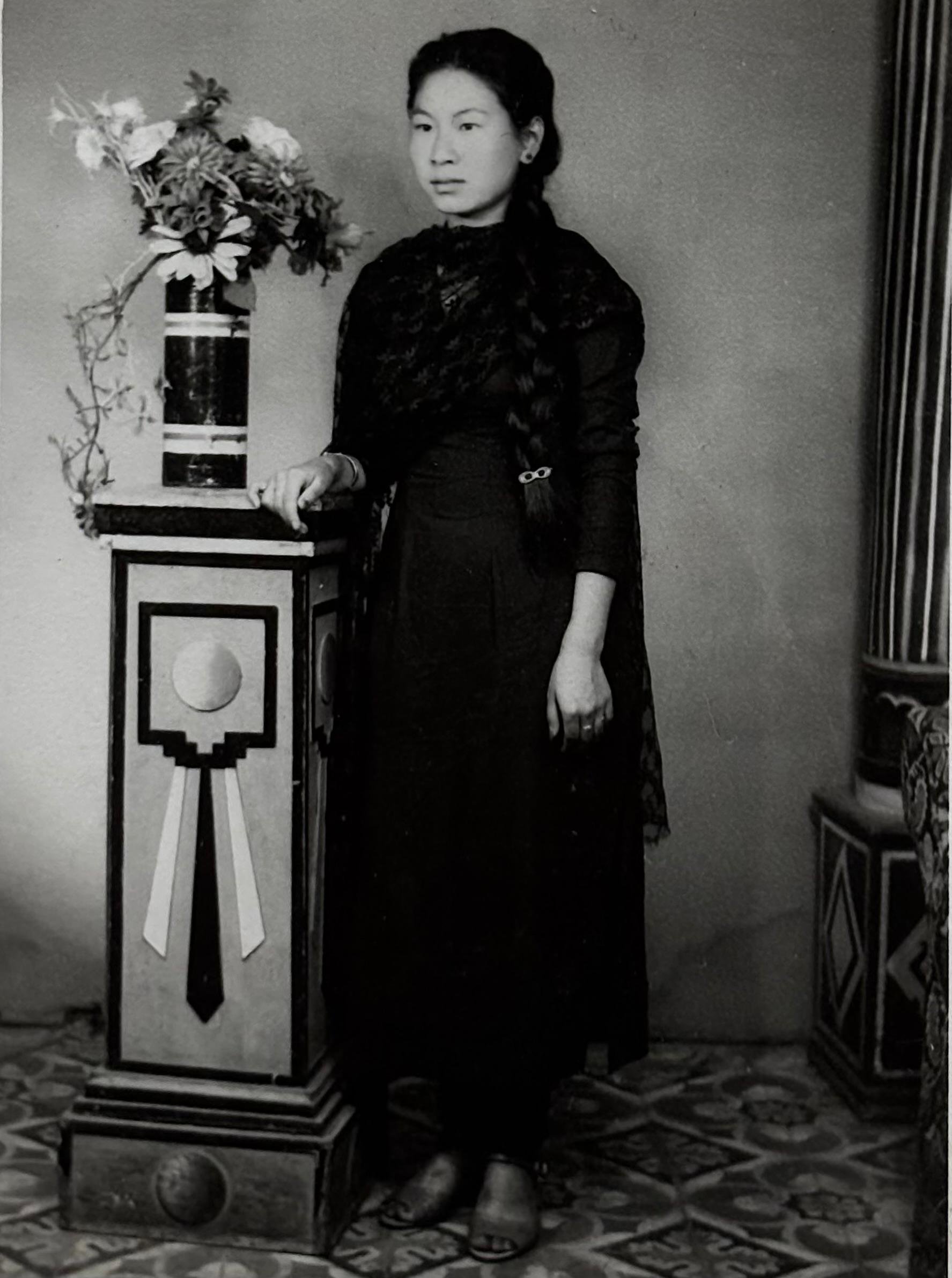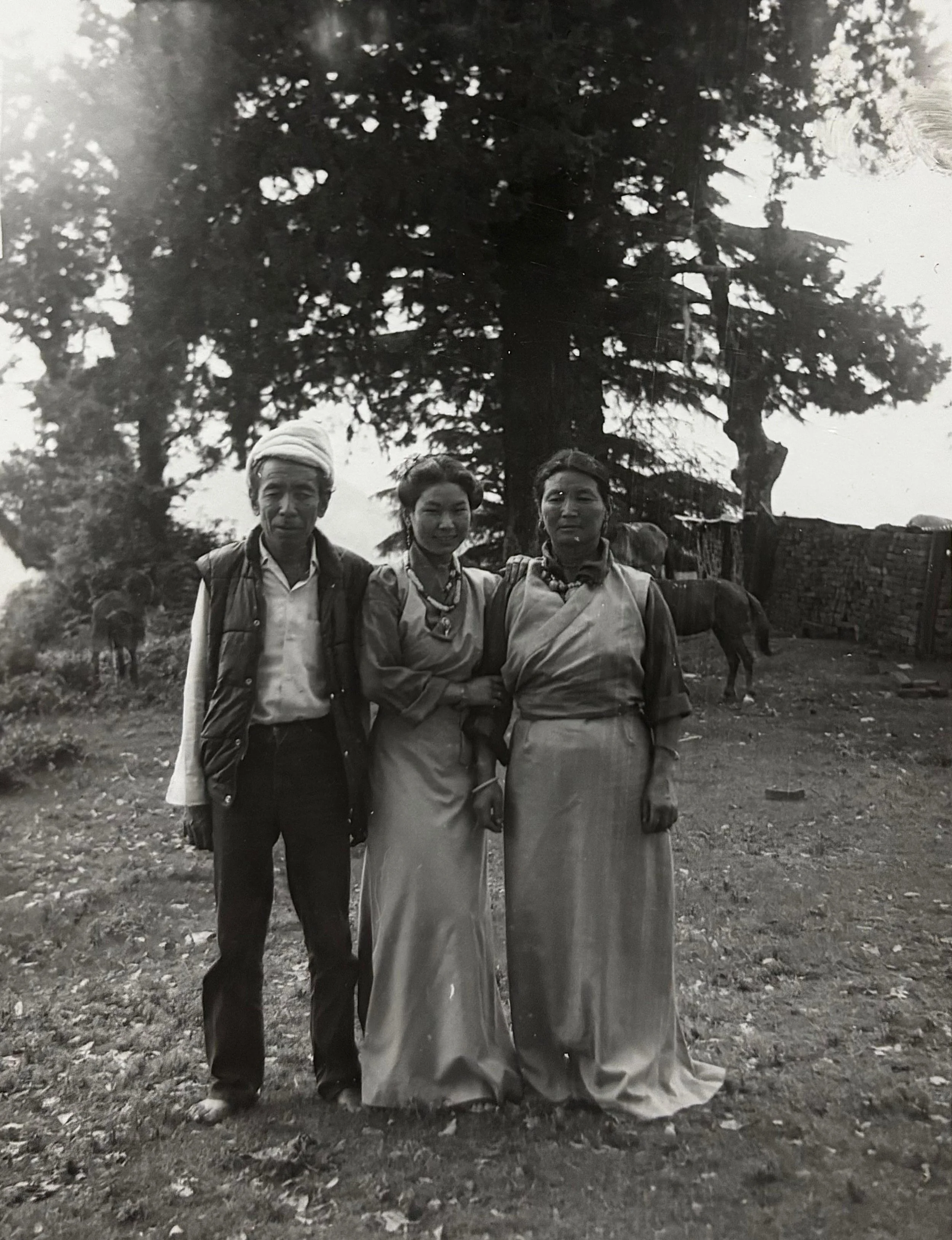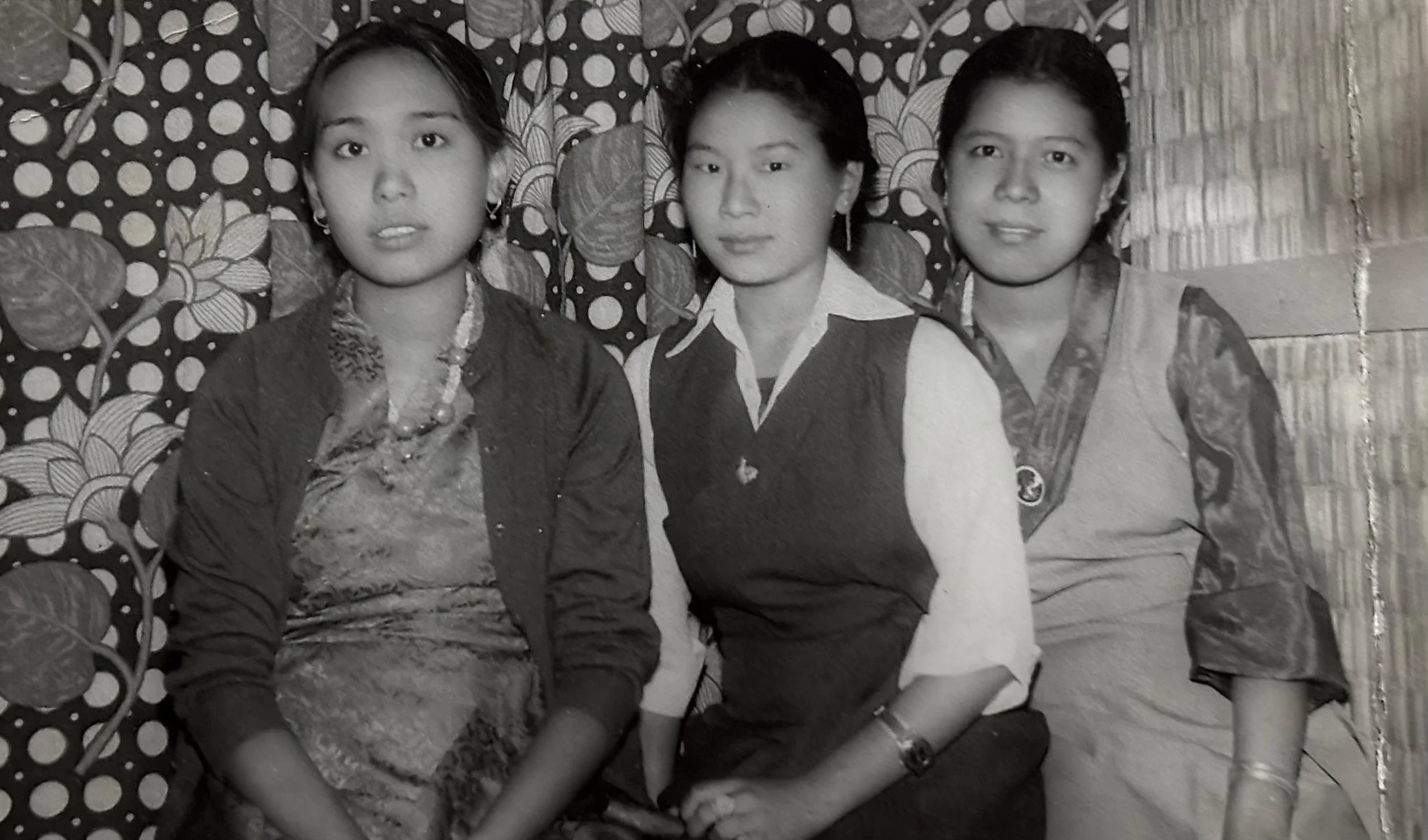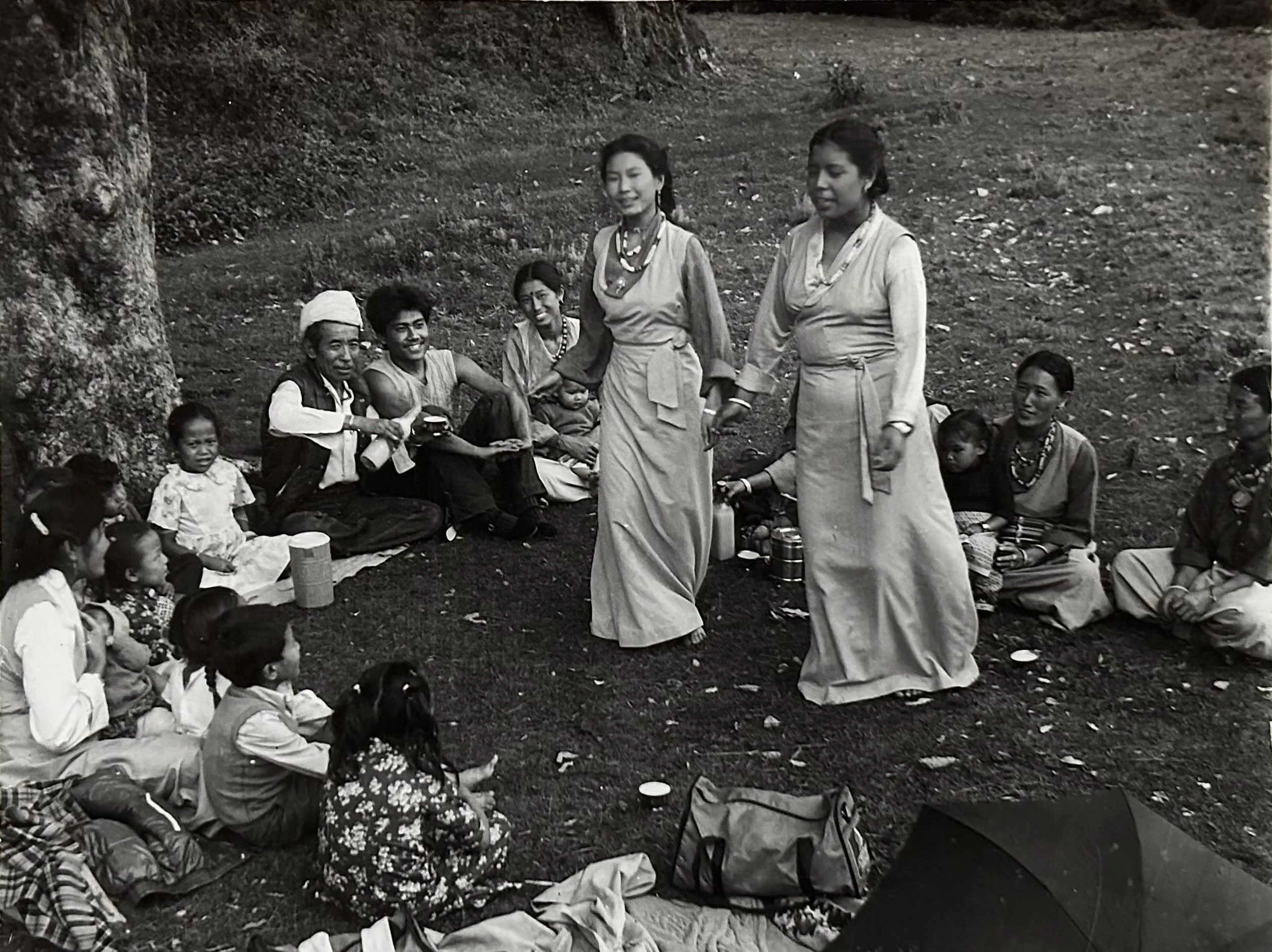All About My Mother
The author’s mother, Tshering Yangchen in a Photo Studio in Nainital, Uttarakhand.
It has been raining for a week straight in my village in Sikkim. The recurring thunderstorms that have accompanied the rain vehemently jolt the wooden walls of our old house. The reverberating vibrations, the creaking of damp wood panels, accompanied by the pattering sound of rain on the roof, evoke a symphony of their own; one similar to that of the Buddhist drums and cymbals. The rain has now eroded parts of the paint off the tin roof, revealing a rusty brown, corroded surface underneath the red sheen. Transfixed with the panoply of sounds that have now engulfed the house unabated, suddenly my phone beeped with a text message. It is from a school friend whom I have lost contact with. The message reads “Hey bro, I'm so sorry to hear about your mother. I just found out about it”. The message brought me back to my immediate reality.
It has now been four months since my mother passed away, all the relatives and friends like migratory birds have returned back to their own world. In my family of two older brothers and my father, no one talks about her anymore. The verbal denial of her death now stages our everyday interactions, as acknowledging her absence would bring about a cathartic pain of grief that is slowly unfurling and recoiling, underneath the shroud of willful amnesia.
I have not been able to process her passing, and with each passing day, the tentacles of grief seem to now rapidly subsume the comfortable facade of denial. Over time, the grief has now cemented itself around the periphery of my throat, making me unable to utter words without bursting into tears. I can feel it swirling inside my stomach, screaming with pain and indignation, aching to be released from the confines of my body. I had to come to terms and face the new reality.
While quietly entering the room, I noticed my father sleeping on the bed with one foot lying outside of the blanket. Is the blanket of denial now failing to cover his body, or is it his own voluntary exposure to the cold grief? I will never know. I don't want to wake him up. The weariness in his face is still visible even when he is asleep. The image of him profusely crying is still etched in my mind. Streams of tears flowing down his wrinkled cheeks, like water flowing down the textured line of parched land as it gently absorbs it.
Her cupboard has not been opened until now. Clothes of varied colours are neatly folded on top of one another. The colours of spring and summer beam out into the foray, yearning to be brushed against her skin one last time. In a strange way, mundane objects like her clothes and other personal belongings now seem to embody and speak for her in her absence. It is as though she has metamorphosed into material objects that now have the power to evoke her presence when seen and touched physically.
Searching through her drawer, I found an old album from her childhood in Nainital. I have never seen it before. Gently leafing through the album, I found old photographs of her with her parents and friends depicting various events of her life before marriage. Her life, before all of us in this house, who are now grieving solitarily.
How do you then write about someone who is no longer present to narrate their story? Do you fall back to the various anecdotes and stories they have shared with you when they were alive? How do you then weave their stories and give them a new life?
My mother was born in Nainital to Tibetan refugee parents who had settled in India prior to the mass migration of 1959. My maternal grandparents were nomads and their only source of income was through seasonal trading and cattle rearing up in the highlands of Tibet. Devastated after losing their two healthy sons to preventable diseases within the span of three years, they had a chance encounter with a sage who advised them to settle in the plains of India, if they wanted their future children to live up to adulthood. With this conviction, they sold off their cattle, traded their belongings and started their journey towards India. In hindsight, the sage’s message was a premonition for what would befall the people of Tibet and their homeland in the coming years.
After moving around in various cities in India for three years, they decided to permanently settle in Nainital with a small community of Tibetan and Khampa traders. And finally nine years after their departure from Tibet, my mother was born in 1965. My grandmother believed it to be the blessings from the local Hindu deity Maa Nanda Devi, who had blessed her with a girl child after many misfortunes and turmoils.
Tshering Yangchen with her Parents in Nainital, Uttarakhand.
“I did not have an easy childhood”, my mother would recount in one of our conversations. Being an only child to two aging parents who were building their lives in a new country had its own set of challenges. But the sense of community provided by a small group of families who had settled together in a ghettoised neighbourhood helped them overcome the vacuum of isolation and dislocation. Her relationship with her parents, as it often is in the community, was marred by contentions over their dependence on alcohol. She would commiserate and recount, often waiting late at night alone, for her drunk parents to come home. She would then tend to them and would force them to eat food, so that they won't wake up with a headache the next morning. Alcohol addiction was common among the community during that time, perhaps the only way to make sense of the new world they had now found themselves in.
Hence, her days in Nainital would revolve around helping her parents in their shop, and then gallivanting with her friends as they indulged in Bollywood gossip flipping through magazines such as Cinestars and Filmfare. Her cupboard still contains strips of cutout photographs of Bollywood stars like Jitender and Dev Anand. In a way, their gradual assimilation into the dominant Indian culture had much to do with Hindi cinema than with any other governmental policies or programs.
Tshering Yangchen (middle) and her friends in Nainital, Uttarakhand.
In school, she developed a keen interest in the arts. She wanted to be an artist, and more specifically, a Thangka artist. She would later abandon this dream when the looming pressure of marriage would arrive, knocking at the door.
For three months every year, November, December and January, the community of traders would travel to the cities and villages away from their settlements and would set up shops in temporary markets. This business process was known as Tshong. This process would often involve the entire family travelling together in groups to such areas. It was also because of this that my mother would have to later quit her education, as her parents would not allow her to stay back in Nainital alone, for the board exams during winters. “If I were a man, they would have let me continue my studies”, she would lament, immediately followed by a rebuttal and an impassioned defense for her parents “How could they allow their only child, that too a girl, to stay in a hostel for three months!”
After Tshong, the group of families would then commence their pilgrimage to Buddhist sites, such as Bodh Gaya, Sarnath, Kushinagar and Lumbini. It was in Banaras in March of 1986, where she first met my father. It so happened that my mother’s cousin was studying at a nearby university in Banaras. When my grandmother found out, she called him for dinner at their rented accommodation on the outskirts of the city. But he did not come alone; he brought four of his friends along with him.
Tshering dances at a picnic, surrounded by friends and Tibetan-Khampa trader families, Nainital, Uttarakhand.
After the dinner, the four college students, equally enamored by my mother, would devise a plan of sending a love letter to my mother’s address in Nainital, and whoever’s letter she would respond to, would be allowed to court her. Months go by and one sunny morning, she receives a letter directed to her by someone from Sikkim. Perplexed after receiving the letter, she decided to respond to him. Turns out all of them had written the letter, but only my father had the courage to dispatch it.
Thus began their courtship, recurring letters were exchanged between Banaras and Nainital. After two years, she finally confided in her parents, who were hesitant at first, but later agreed to meet him on their next trip to Banaras. A date and time was fixed, 27th February 1988, 5 P.M, to be exact.
They all waited inside the shed at the entrance of the bazaar. It was 5 P.M. and there were no signs of his presence. Streams of passerby, going to the weekly bazaar bustled with joy and excitement. Her father, livid with anger, stared at his watch and exclaimed “It is 5:30 P.M. already. He is not coming. Let’s head back!” She was now on the verge of tears, frantically moving back and forth across the border of the shed. With the late winter sun slowly setting in, her hopes diminished with each passing minute. It was 5:45 P.M. The vegetable sellers have started igniting their kerosene lamps, placing them on the cart, which flickered like fireflies as it hovered on top of the vegetables. Her mother with a remorseful gaze that only the child knows, consoled her half sobbing daughter as she hugged her. It was time to leave.
“I can see him! Is that him?” her father exclaimed. Suddenly amidst the sea of crowd, he appeared, drenched in sweat, profusely wiping his face with the handkerchief, “I am really sorry for the delay.”
Growing up I would see my mother preparing Chang, a fermented rice beer traditionally made two months before Losar or Tibetan Lunar New year. While kneading the malleable rice onto the plastic surface, her forehead would glisten with sweat from the vapor of the steamed rice. The rice together with the yeast would be placed inside a bucket, covered with a plastic sheet and a thick blanket, it is then set aside for fermentation. After two months, the white translucent alcohol would settle on top of the surface, emitting a sweet pungent smell that would waft throughout the house, signalling the start of a new year or new beginnings. Now that she is gone, I don’t think there will ever be a new beginning in my life anymore. Like the steamed rice inside the bucket, I will hide underneath the plastic sheet and ferment with memories of her, and maybe one day I will come out of the bucket.





